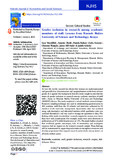Please use this identifier to cite or link to this item:
http://ir-library.mmust.ac.ke:8080/xmlui/handle/123456789/2191Full metadata record
| DC Field | Value | Language |
|---|---|---|
| dc.contributor.author | Mandillah, Lucy | - |
| dc.contributor.author | Okoth, Annette | - |
| dc.contributor.author | Buhere, Pamela | - |
| dc.contributor.author | Anyonje, Lydia | - |
| dc.contributor.author | Wanjala, Christine | - |
| dc.contributor.author | Ouda, James Bill | - |
| dc.contributor.author | Achoka, Judith | - |
| dc.date.accessioned | 2023-05-19T11:13:30Z | - |
| dc.date.available | 2023-05-19T11:13:30Z | - |
| dc.date.issued | 2023-04-13 | - |
| dc.identifier.uri | https://doi.org/10.58256/njhs.v7i2.1094 | - |
| dc.identifier.uri | https://royalliteglobal.com/njhs/article/view/1094/563 | - |
| dc.identifier.uri | http://ir-library.mmust.ac.ke:8080/xmlui/handle/123456789/2191 | - |
| dc.description.abstract | All over the world, research has shown that women are underrepresented and generally face discrimination and marginalization on the basis of their gender. It is against this background that this study sought to establish the status of gender inclusion in research among academic members of staff with a focus on Masinde Muliro University of Science and Technology (MMUST), Kenya. The study employed a mixed methods research design. Purposive sampling technique was used in administering questionnaires to 104 academic staff from the 11 schools and interviews subjected to 14 members of the university management. Quantitative data was analyzed using both descriptive and inferential statistics while qualitative data was analyzed thematically and was used to triangulate quantitative data. The findings of the study revealed that research outputs for women were lower than their male counterparts. For example, males were more dominant in publications at 55% while females were at 45%. The study further revealed that workload, gender stereotypes, lack of mentorship and inadequate resources had an impact on the women’s research output. These findings will be instrumental in supporting universities to strengthen structures and develop programmes that support research, particularly among women at all levels of their career. | en_US |
| dc.language.iso | en | en_US |
| dc.publisher | Nairobi Journal of Humanities and Social Sciences | en_US |
| dc.subject | Gender,inclusion, research , academic, Members, staff, Lessons, University, Science and Technology | en_US |
| dc.title | Gender inclusion in research among academic members of staff: Lessons from Masinde Muliro University of Science and Technology, Kenya | en_US |
| dc.type | Article | en_US |
| Appears in Collections: | Journal Articles | |
Files in This Item:
| File | Description | Size | Format | |
|---|---|---|---|---|
| 1094-Article Text-3148-1-10-20230416.pdf | 423.68 kB | Adobe PDF |  View/Open |
Items in DSpace are protected by copyright, with all rights reserved, unless otherwise indicated.
